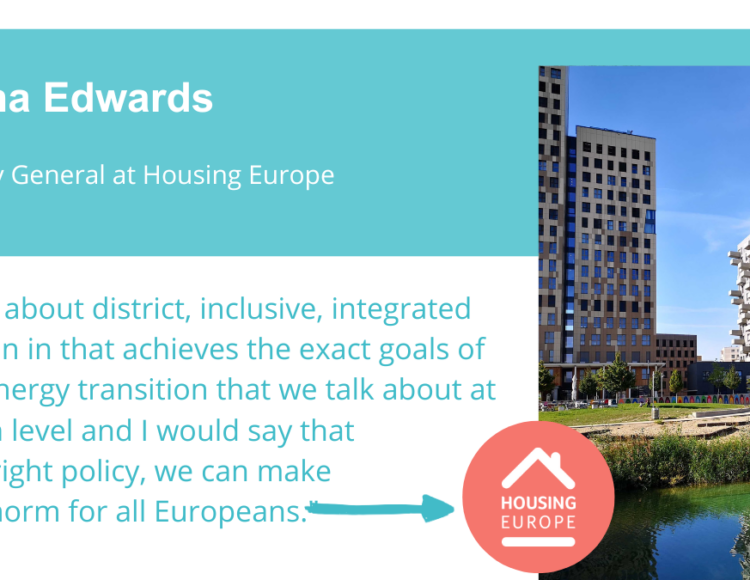In the midst of an energy crisis, it is of crucial importance to shield the most vulnerable tenants and residents to protect them from social exclusion and health risks. It is also vital to continue with renovation to reduce energy needs. However, at what cost?
Housing Europe’s final event for the year brought public, cooperative, and social housing providers and policymakers to react to the national strategies to shield the population from the massive rise in prices and share their actions on the ground and at the European, national, and local policy levels.
Setting the context, our Research Coordinator, Dara Turnbull reported that electricity and heating account for 36% of inflation and showed a big east-west divide putting low-income households in Estonia, Lithuania, and Hungary (but also many other European countries) in an incredibly difficult situation to tolerate. The hardship has not been equally felt as some countries have offered more support programmes or been less tied to Russia. While pre-existing EU level of the poverty rate amounted to 3.6%, worrying numbers from the Joint Research Centre show that the percentage of citizens falling into the poverty trap can be more than double. The situation is changing dramatically in the Baltic states and Greece. “We need to invest to make sure that we improve homes but when we see that the cost of renovation, prices are higher than the past many, many decades. This is not a temporary blip and we hope the numbers will make policymakers act,” Dara Turnbull added.
In EU’s defence, Senior policy officer the European Commission’s DG Justice, John Taylor announced that last Monday, the EU body managed to get the main players to sign a declaration that should help consumers this winter. The document involves a mechanism that allows long-term payment of energy bills, avoids energy cut-offs, and one-side changes to energy contracts.
In less than an hour, Housing Europe’s network pointed out what measures have been delivering results, what is not working, and what could be a game-changer in this period of cost-of-living emergency.
“After the start of the Ukrainian war, the cost of construction including renovation in Estonia has increased by 20-30%. This has resulted in the cancellation or postponement of renovation projects by housing associations,” the head the International Relations and Projects, Estonian Union of Co-operative Housing Associations (EKYL) said. She went on to saying that for the moment, energy poverty is hidden because of the temporary subsidies supporting people but also warned that the 25% inflation in the country will have a negative effect.
The President of the Spanish Social Housing Association (AVS), Maria Montes explained that Spain has exceptionally reviewed public procurement contracts affected by the rise of prices of certain materials, such as bituminous, aluminium, or copper, to compensate entrepreneurs who had signed a contract before the inflation. She added that if we want to work on deep renovations, make homes more efficient and if we are to deliver more comfortable homes for our tenants, it is important to extend the deadline for recovery funds when it comes to renovation.
In Austria, the limited-profit housing sector is proving to be more resilient as it offers stability and low rents that are not linked to the consumer price index, the Researcher of the Austrian Federation of Limited-Profit Housing Associations (GBV), Gerald Koessl pointed out. He described the new instrument “Wohnschirm” that supports households with rent or utility bills arrears.
After our Project and Innovation Manager, João Gonçalves showcased multiple affordable and green examples across Europe, our Secretary General said: “we see district, inclusive, integrated renovation that achieve the exact goals of the fair energy transition we talk about at European level and I would say that with the right policy, we can make that the norm for all Europeans.” She added: “This is a reality check that policymakers must listen to the organisations protecting the most vulnerable, making the transition happen and that they adapt their tools. We need guarantees for renovation loans and an increased level of subsidies.”
